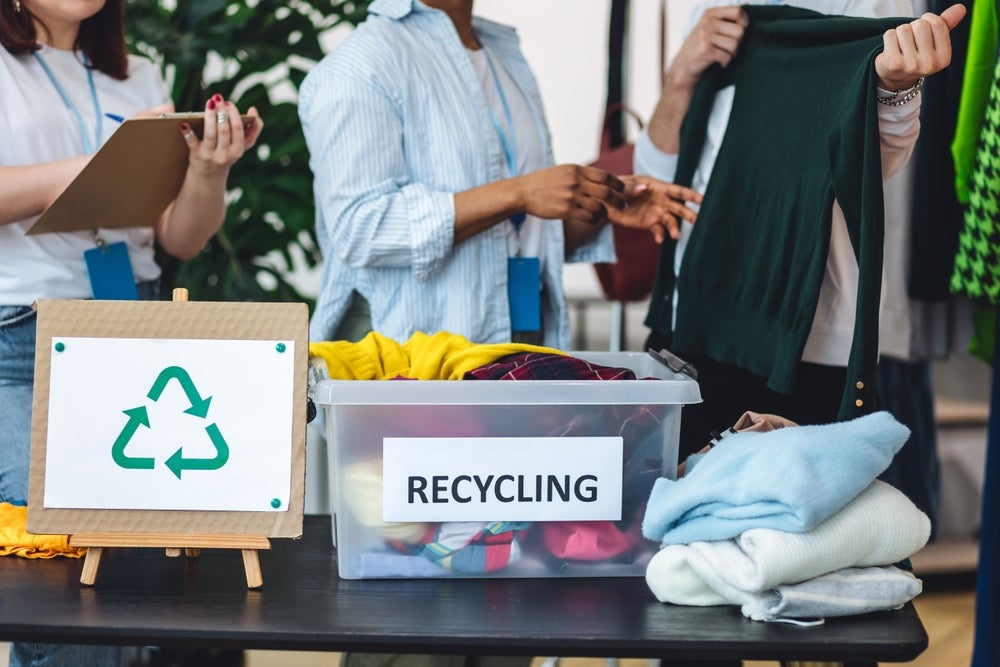Dr Sheng Lu, professor of apparel studies at the University of Delaware recently quizzed his Gen Z students on the impact of US president Donald Trump's tariffs against leading fashion sourcing countries.
He explains: "Our students’ responses reveal the impacts of the tariff increase on ordinary US consumers are real, direct, and significant."
In a special mini-series Just Style shares Generation Z's take on Trump's tariffs from the impact of price increases to sustainability concerns and their thoughts on what the increased duties could mean for the likes of Shein and Temu.
Does sustainability matter to Gen Z when tariffs make prices go up?
Fashion merchandising and management major student Rachel Zemel suggests sustainability matters even more when prices go up as it forces her to think about the long-term value of what she's buying.
She adds that even on a student budget, she tries to prioritise brands that are transparent about their production or at least make some effort toward ethical practices.
She admits it’s not always possible to buy 100% sustainably, but she tries to support thrifting, small designers, and not overconsuming: "Sustainability isn’t just about buying the “right” thing, it’s about shifting the way we shop. That mindset doesn’t go away just because prices are rising."
Fashion merchandising and management and philosophy double major Alexandra Untu concurs, stating sustainability goes far beyond money as it is a moral responsibility that should not be abandoned. But, she does highlight shopping with sustainability in mind isn’t always the easiest or the cheapest option.
Untu shares: "Now, more than ever, we should be doing or learning to do the right thing. Every purchase sends a message about the change we want to see. Every purchase is a small step toward a better, more responsible future for us and for our children."
Fashion merchandising and management and fashion design and product innovation double major student Annabelle Gensler admits that as a consumer, it can be exhausting at times to pay attention to sustainability.
"It’s a word we hear so often and across contexts that many have a hard time recognising, understanding, and defining it. The lack of a universal definition for sustainability makes it incredibly challenging to determine whether or not a given fashion and apparel good is inherently sustainable. While it is impossible to know how my consumption might change with an increase in price, I do foresee sustainability remaining a factor of consideration when going shopping for clothes," she explains.
When it comes to sustainability, Gensler think it's important to pick and choose her battles.
She clarifies: "I avoid purchasing clothing made entirely from synthetic or plastic-based fibres like polyester, I rewear clothing items to minimise water usage and microplastic release in the wash, treat stains, mend imperfections, and do what I can to maximise the lifespan of what I already own.
"I am, however, quite guilty of giving into the next-day delivery services offered by Amazon. As a college student, and in this current phase of life, living in a way that is entirely sustainable feels unsustainable. Personally, I find that the most manageable ways to practice sustainability on a daily basis have to do with fashion and apparel, which leads me to believe that sustainability will remain important to my consumer behaviour regardless of what price fashion and apparel goods may be offered at in the future."
Fashion merchandising and management major and 4+1 graduate student Lola Kulis would rather buy less and choose more wisely than spend more on items that contribute to overproduction and waste. As she prepares to enter the fashion industry, she says it’s important to practice what she preaches and support long-term goals.
Sustainability is also something that fashion merchandising and management major Madison Toth genuinely cares about. When shopping, she tends to lean more towards brands that practice ethical sourcing and are more transparent about where their items come from.
She shares: "From my time as a student, I have learned many of the horrible outcomes of the fashion industry related to sustainability. From seeing videos of workers begging for higher wages, dyes being dumped into bodies of water, and looking at the incredibly tall piles of textile waste, it sticks with me both as a student and a consumer."
Toth does her best to shop secondhand and donate all of her old apparel. If a price increase meant that apparel manufacturers were getting paid fair wages, she would purchase those items. However, now, due to tariffs, she is more likely to dodge popular retailers.
"Sustainability is very important to my generation, and I value the efforts that brands have made to become more sustainable. But it raises the question, when is a price so high that sustainability no longer matters? It’s hard to say. I think it depends on the economic status of each consumer. From sustainable companies with higher prices, there are purchases that I just cannot justify paying. I do care about sustainability, but there does come a point where it becomes financially unattainable," she states.
Fashion design and product innovation major Katie Yasik adds that it's not always easy to prioritise, especially on a student budget. She believes it’s important to consider the environmental and social impact of fast fashion, and if prices are going up anyway, she’d rather invest in something that aligns with her values.
Fashion merchandising and management major and 4+1 graduate student Isabella DiGiulio predicts tariffs will bring a new wave of interest in sustainability, particularly for donation-based, secondhand clothing stores.
She says: "These stores will likely be able to maintain their low pricing because they do not need to account for operational expenses in apparel production. Even if there is to be a price increase, their prices may still remain relatively lower and more affordable compared to first-hand clothing brands. Sustainable clothing brands like Reformation are already priced beyond my budget as a college student, and the introduction of tariffs will only further increase their inaccessibility."
But, she points out sustainable shopping doesn’t solely refer to purchasing secondhand goods or buying from brands with biodegradable fabrics or ethical labour practices.
DiGiulio continues: "Sustainable shopping can also refer to the abstinence from shopping. With influences such as social media and fast fashion, overconsumption has become an extremely normalised practice through which many people, especially Gen Z, feel compelled to consistently refresh their wardrobes to follow trends and keep up with the ever-changing standards of style and identity. The price change will likely require all consumers to reconsider their shopping habits. This may require many to reconsider what they already have in their closet. This means consumers should consider other means such as upcycling, mending damaged clothing, or sharing with friends. Sharing clothing with friends is already a very common practice amongst college students who generally have a limited budget. I would encourage everyone to consider doing so, as it maximises the amount of wear for a product."
Navigate the shifting tariff landscape with real-time data and market-leading analysis. Request a free demo for GlobalData’s Strategic Intelligence here.














